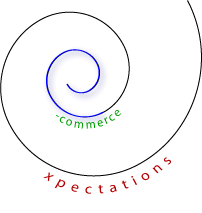In the post-Internet-boom period, it’s easy to forget about some old friends, so here I thought I’d drop in and revisit e-commerce…
 The old joke about commitment being like a ham and eggs breakfast certainly applies to producers (of goods) and consumers in the industrial economy. The punch line is that the chicken (consumer) is involved, but the pig (producer) is committed.
The old joke about commitment being like a ham and eggs breakfast certainly applies to producers (of goods) and consumers in the industrial economy. The punch line is that the chicken (consumer) is involved, but the pig (producer) is committed.
A large part of producers’ inflexibility today is due to the fact that they are committed to bits (as opposed to bytes) at all stages of production and distribution: inputs, inventory, safety stocks, unsold goods, returns “… the whole catastrophe,” as Zorba says. These commitments are, in many cases, more important to producers than putting the customer first, and they represent a critical barrier to industrial economy companies’ intimacy with consumers because companies must sacrifice customer needs to maintain their operating realities. (For more on this, see Transformation: from Self-contained Company to Networked Global Organization.)
E-Commerce is steadily liberating producers from this dilemma in many categories. Let’s take a banal example. Probably most readers have shopped at “Earth’s Biggest Bookstore.” For many people, it defined the e-commerce experience. […]

 The old joke about commitment being like a ham and eggs breakfast certainly applies to producers (of goods) and consumers in the industrial economy. The punch line is that the chicken (consumer) is involved, but the pig (producer) is committed.
The old joke about commitment being like a ham and eggs breakfast certainly applies to producers (of goods) and consumers in the industrial economy. The punch line is that the chicken (consumer) is involved, but the pig (producer) is committed.